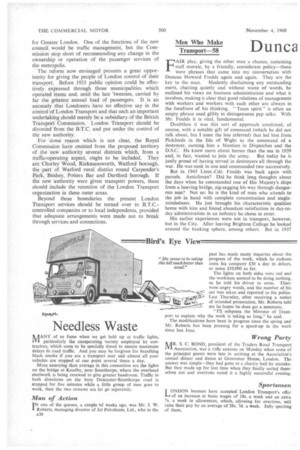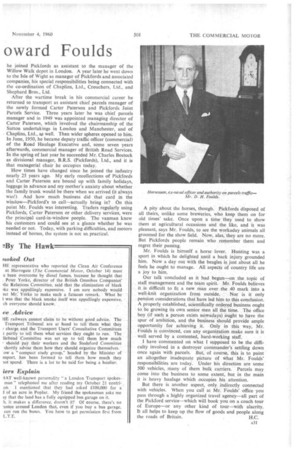Dunca oward Foulds
Page 32

Page 33

If you've noticed an error in this article please click here to report it so we can fix it.
FAIR play, giving the other man a chance, sustaining staff morale, by a friendly, considerate policy—these were phrases that came into my conversation with Duncan Howard Foulds again and again. They are the key to the man. Modestly disclaiming any outstanding merit, chatting quietly and without waste of words, he outlined his views on business administration and what it involves, making it clear that good relations of management with workers and workers with each other are always in the forefront of his thinking. "Team spirit" is often an empty phrase used glibly in disingenuous pep talks. With Mr. Foulds it is vital, fundamental.
Doubtless it was this sort of .approach combined, of course, with a notable gift of command (which he did not talk about, but I none the less inferred) that led him from Pickfords in the Isle of Wight to the command of a destroyer, earning him a Mention in Dispatches and the D.S.C. He knew more about horses than the sea in 1939 and, in fact, wanted to join the army. But today he is justly proud of having served in destroyers all through the war. He was sunk in one and commanded two successively.
But in 1945 Lieut.-Cdr. Foulds was back again with parcels. Anticlimax? Did he think long thoughts about the days when he commanded one of His Majesty's ships from a heaving bridge, zig-zagging his way through dangerous seas? Not so: he is the kind of man who attends to the job in hand with complete concentration and singlemindedness. He just brought his characteristic qualities home with him and found abundant satisfaction in day-today administration in an industry he chose to enter.
His earlier experiences were not in transport, however, but in the City. After leaving Brighton College he looked around the banking sphere, among others. But in 1937
he joined Pickfords as assistant to the manager of the Willow Walk depot in London. A year later he went down to the Isle of Wight as manager of Pickfords and associated companies, his special responsibilities being connected with the co-ordination of Chaplins, Ltd., Crouchers, Ltd., and Shephard Bros., Ltd.
After the wartime break in his commercial career he returned to transport as assistant chief parcels manager of the newly formed Carter Paterson and Pickfords Joint Parcels Service. Three years later he was chief parcels manager and in 1949 was appointed managing director of Carter Paterson, which involved the chairmanship of the Sutton undertakings in London and Manchester, and of Chapfins, Ltd., a,s well. Then wider spheres opened to him. In June, 1950, he became deputy traffic officer (commercial) of the Road Haulage Executive and, some seven years afterwards, commercial manager of British Road Services. In the spring of last year he succeeded Mr. Charles Bostock as divisional manager, B.R.S. (Pickfords), Ltd., and it is that managerial chair he occupies today.
How times have changed since he joined the industry nearly 25 years ago. My early recollections of Pickfords and Carter Paterson are bound up with family holidays, luggage in advance and my mother's anxiety about whether the family trunk would be there when we arrived (it always was!) And how much .business did that card in the window—Pickford's to call—aCtually bring in? . on this point Mr. Foulds was interesting. Traders regularly using Pickfords, Carter Paterson or other delivery services, were the principal card-in-window people. The vanman knew his customers and could see at a glance whether he was needed or not. Today, with parking difficulties, and motors instead of horses, the system is not so. practical. A pity about the horses, though. Pickfords disposed of all theirs, unlike some breweries, who keep them on for old times' sake. Once upon a time they used to show them at agricultural occasions and the like, and it was pleasant, says Mr. Foulds, to see the workaday animals all groomed for the show field. Now, alas, they are no more. But Pickfords people remain who remember them and regret their passing.
Mr. Foulds is himself a horse lover. Hunting was a sport in which he delighted until a back injury grounded him. Now a day out with the beagles is just about all he feels he ought to manage. All aspects of country life are a joy to him.
Our talk concluded as it had begun—on the topic of staff management and the team spirit. Mr. Foulds believes it is difficult to fit a new man over. the 40 mark into a well-knit organization from outside. Nor is it only pension considerations that have led him to this conclusion. A properly established, scientifically ordered business ought to be growing its own senior men all the time The office boy (ifsuch a person exists nowadays) ought to have the spur of ambition, and the business should provide ample opportunity for achieving it Only in this way, Mr. Foulds is convinced, can any organization make sure it is well served by a contented, hard-working staff.
_I have commented on what I supposed to be the difficulty involved in a destroyer commander's settling down once again with parcels. But, of course, this is to paint an altogether inadequate pictureof what Mr. Foulds' responsibilities are today. Under his direction are some 500 vehicles, many of them bulk carriers. Parcels may come into the business to some extent, but in the main it is heavy haulage which occupies his attention.
But there is another aspect, only indirectly connected with vehicles. When you call at Mr. Foulds' office -you pass through a highly organized travel agency—all part of the Pickford service—which will book you on a coach tour of Europe—or any other kind of tour—with alacrity. It all helps to keep up the flow of goods and people along the roads of Britain. H.C.
























































































































